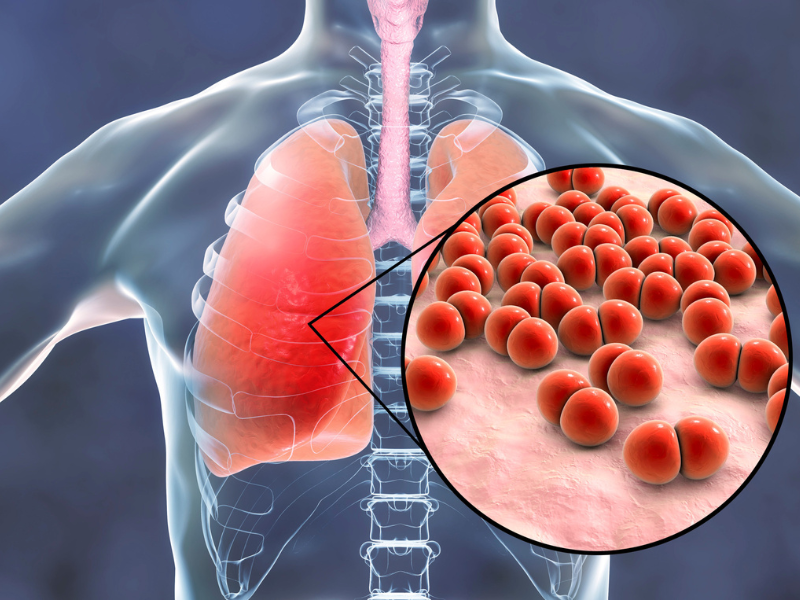Pneumonia

Pneumonia is a respiratory infection that affects the lungs. It can be caused by various microorganisms, including bacteria, viruses, and fungi. The infection causes inflammation in the alveoli, which are tiny air sacs in the lungs. This results in the collection of fluid or pus that makes breathing difficult. Pneumonia can range from mild to severe, and in some cases, it can be life-threatening.
Symptoms of Pneumonia
Pneumonia symptoms range from mild to severe, depending on the germ causing the infection, your age, and overall health. Mild signs and symptoms can be comparable to those of a cold or flu, but they remain longer.
Pneumonia symptoms may include the following:
· Chest pain during breathing or coughing
· Cough, which can generate phlegm.
· Confusion or alterations in mental awareness (in persons aged 65 and up)
· Fatigue
· Lower than normal body temperature (in those over 65 and those with weakened immune systems)
· Fever, sweat, and shivering chills
· Nausea, vomiting, or diarrhea.
· Shortness of breath.
· Newborns and infants may not exhibit any symptoms of the infection. Alternatively, they may vomit.
Causes of Pneumonia
Pneumonia occurs when your immune system attacks an infection in the tiny sacs of your lung (alveoli). This causes the lungs to enlarge and leak fluid.
Pneumonia can be caused by a variety of bacteria, viruses, and fungi. Adults are more likely to be infected with bacteria. School-aged children, on the other hand, are more likely to contract viruses. Common illnesses that can lead to pneumonia are:
· COVID-19
· Influenza virus
· Legionnaires’ disease
· Human parainfluenza virus (HPIV)
· Human metapneumovirus (HMPV)
· Common colds
· Pneumococcal disease
Risk factors of Pneumonia
Certain factors can increase the risk of developing pneumonia, including:
- Age: Young children and older adults are at a higher risk of developing pneumonia.
- Weakened immune system: People with weakened immune systems are at a higher risk of developing pneumonia, such as those with:
- HIV
- cancer
- organ transplants
- Chronic lung disease: People with chronic lung diseases are at a higher risk of developing pneumonia. This includes those with chronic obstructive pulmonary disease (COPD) or asthma.
- Hospitalization: People who are hospitalized, especially those in intensive care units, are at a higher risk of developing this disease.
- Smoking: Smoking damages the lungs and increases the risk of developing this disease.
- Exposure to chemicals or pollutants: Exposure to chemicals or pollutants can increase the risk of developing this condition.
Treatment options for Pneumonia
The treatment options for pneumonia depend on the following:
· The cause of the infection
· the severity of the infection
· the overall health of the individual
Treatment options include:
- Antibiotics: Antibiotics are used to treat bacterial pneumonia. The type of antibiotic used depends on the type of bacteria causing the infection.
- Antiviral medications: Antiviral medications are used to treat viral pneumonia. Antiviral medications may include peramivir, zanamivir and oseltamivir.
- Antifungal medications: Antifungal medications are used to treat fungal pneumonia.
- Supportive care: Supportive care, such as oxygen therapy, fluid replacement, and rest, is often necessary for people with severe pneumonia.
In addition to medication, treatment may also include:
- Rest and fluids: Getting plenty of rest and staying hydrated can help the body recover from pneumonia.
- Oxygen therapy: In severe cases, oxygen therapy may be necessary to help the patient breathe.
- Pain relief: Over-the-counter pain relievers can help relieve fever and pain. This includes acetaminophen or ibuprofen.
- Respiratory therapy: Respiratory therapy may be necessary to help clear the lungs and improve breathing.
Pneumonia Prevention
There are several steps you can take to prevent pneumonia, including:
- Vaccination: Vaccines are available to prevent certain types of pneumonia, such as pneumococcal pneumonia and influenza.
- Good hygiene: Wash your hands frequently. Avoid close contact with people who are sick to help prevent the spread of germs that cause pneumonia.
- Don’t smoke: Smoking damages the lungs. It also increases the risk of pneumonia.
- Practice healthy habits: Eat a healthy diet. Get regular exercise, and get enough sleep to help boost the immune system and prevent pneumonia.
- Stay hydrated: Drinking plenty of fluids can help prevent dehydration and keep the respiratory system healthy.



